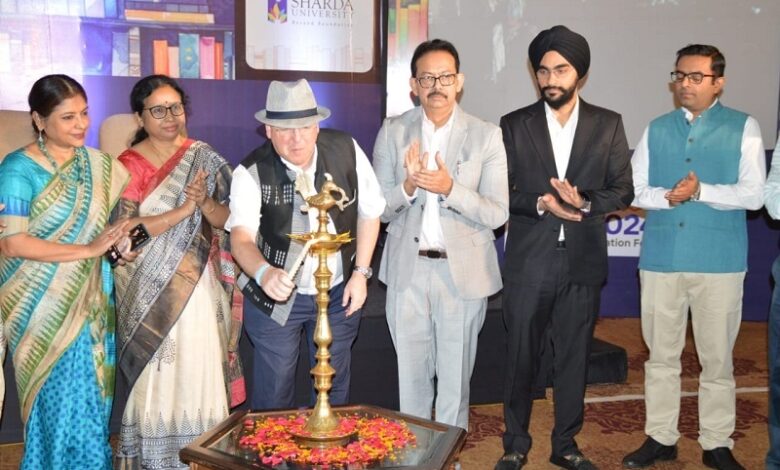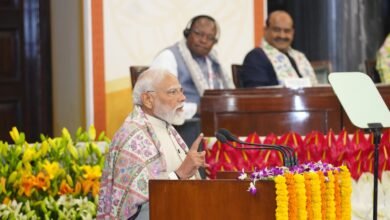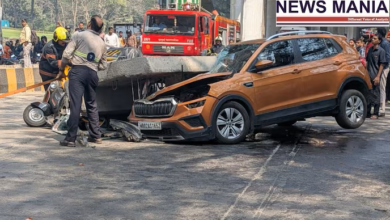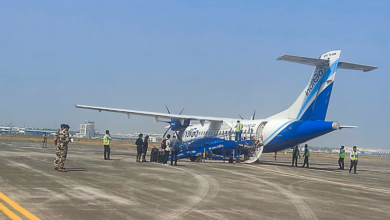India
Educational infrastructure development and expansion in West Bengal marching ahead at fast pace
Introduction of New Education Policy 2020 in Bharat is reforming and revolutionizing entire education sector across all states across Bharat.

By : PARTHA ROY
In West Bengal , educational scape is growing at fast pace promoting inclusive education on the inspiration of Chief Minister of West Bengal Smt. Mamata Banerjee .Indian Chamber of Commerce (ICC) organised its 6th Globalised Education Forum on 27th April 2024, on the theme “Inclusive Education: Promoting inclusivity in education, in the perspective of professional courses ” to explore and deliberate on promoting Inclusivity in professional education .
6th Global Education Fourm was attended by wide spectrum of thought leaders , educationists including Smt. Chandani Tudu, IAS, Senior Special Secretary, Higher Education Department, Government of West Bengal; Dr. Andrew Alexander Flemming, Deputy High Commissioner, British Deputy High Commission, Kolkata; Mr. Hemant Sahal, Founder & CEO, Digii ; Mr. Satyam Roychowdhury, Chairman, ICC National Expert Committee on Higher Education & Training and Chancellor, Sister Nivedita University; Prof. Dhrubajyoti Chattopadhyay, Vice Chancellor, Sister Nivedita University; Sardar Simarpreet Singh, Chairman, ICC National Expert Committee on Higher Education & Training and Director, JIS Group , Dr.Saikat Maitra, Former Vice Chancellor, MAKAUT; Ms. Kasturi Kejriwal, COO, Aditya Group.
Smt. Chandani Tudu, IAS, Senior Special Secretary, Higher Education Department, Government of West Bengal highlighted on various policy initiatives of Government of West Bengal for healthy inclusive development of education sector across West Bengal as well as presented broad overview of the growth of education sector in the state despite multiple challenges.
Smt. Tudu emphasized that true inclusiveness and genuine empowerment can be attained only when the opportunities are within reach for all, irrespective of their socio-economic status, geographical location, or physical abilities. West Bengal is the pioneering state to notify its State Education Policy, 2023 on 05,September 2023.
West Bengal Government has prioritized the establishment of new universities and colleges across the State, aiming to ensure inclusivity and accessibility to higher education for students from all regions over the past decade.A significant policy initiative involves the establishment of a university in every district to get the access to higher studies for the students who are living in the remotest regional areas.
For Promotion of different languages, like Santhali, Urdu, Arabic, Persian, Tibetan, Nepali, Tamil, and Hindi, are offered at both undergraduate (UG) and postgraduate (PG) levels in Higher Education Institutions (HEIs) across West Bengal so that the individuals can get access in education in their own language.
West Bengal Government has set up Institute of Language Studies and Research (ISLR), to advance the teaching and learning of English, regional languages, and translational studies, to promote inclusivity of different languages in higher education.
West Bengal Government launched different Scholarship schemes like Swami Vivekananda Merit-cum-Means Scholarship, Aikyashree, Medhashree, Shikhshree etc. Kanyashree-3 Scholarship, is launched to support girl students for pursuing postgraduate studies.
Additionally, the State Government has implemented West Bengal Free ship Scheme, granting economically disadvantaged students studying in self-financed private engineering/technical colleges in West Bengal a waiver of tuition fees.
Since June, 2021, Higher Education Department has launched student Credit card Scheme . Under the scheme a student can get up to Rs.10.00 lakhs loans from banks at the nominal interest for pursuing their studies in the State, in India and abroad.West Bengal government is strategically clustering universities, colleges, Polytechnics , and schools within districts to enhance collaboration, resource sharing, and academic exchange, ultimately enriching the educational experience for the students.
Total number of Higher Education Institutions (HEIs) in West Bengal has increased from 1056 in 2011 to 2049 in 2023.
Institutional Density (No of Colleges per 1000 sq Km) has increased from 11.9 in 2011 to 25.4 in 2023.
Gross Enrolment in HEIs has increased from 13. 24 Lakhs in 2011 to 27.22 Lakhs in 2023.
Gross Female enrolment has increased from 5.62 Lakhs in 2011 to 13.46 Lakhs in 2023
Female Gender ratio has increased from 42% in 2011 to 49.50% in 2023.
The Annual Plan budget in Higher Education has increased from Rs. 1724 cr. In 2011-12 to 6404 Cr. in 2024-25.
Dr. Andrew A Flemming said “…. All individuals have the potential to succeed and shine bright, therefore it’s necessary and important for us to collaborate and work towards building a more inclusive education system.”
While delivering welcome address, Mr. Satyam Roychowdhury, said, “….I believe India has effectively implemented various strategies, such as The Rights of Persons with Disabilities Act, demonstrating our commitment to inclusive education. However, challenges persist, including the need for adequate resources and educational infrastructure. Collaborative efforts are essential to foster a more inclusive and diverse culture. We must strive to create an environment where every individual has equal opportunities to contribute to society, thereby promoting inclusivity in education and empowering countless individuals. Together, we can make a meaningful difference in this realm.”
Prof. Dhrubajyoti Chattopadhyay, Vice Chancellor, Sister Nivedita University, emphasized and said “… inclusive education requires collaborative efforts to create an environment where inclusivity prevails, empowering individuals.”
Sardar Simarpreet Singh, Director, JIS Group, stated, “….. The key takeaway is the imperative for collaborative efforts between the private and government sectors to enhance inclusivity and foster development, especially in professional courses, within our dynamic and multifaceted educational landscape.”
Ms. Kasturi Kejriwal, COO, Aditya Group, said “Change is necessary and constant. There’s a need to understand holistic development. …”






